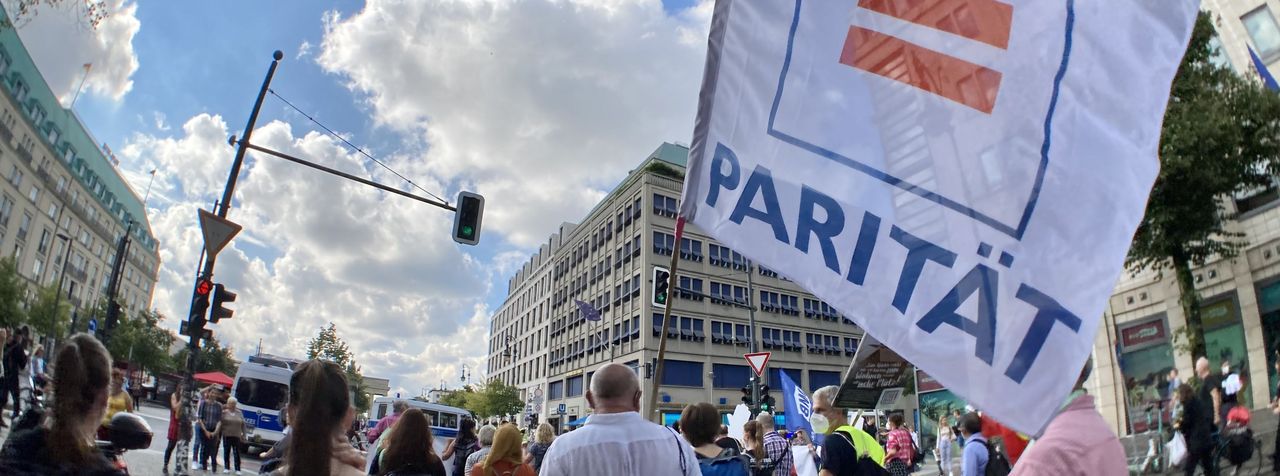Verband

About the Association
The Paritätische is an association of social movements. Like its member organisations, the Paritätische is committed to the idea of social justice: equal opportunities, the right of every human being to live a life of dignity in which they can develop freely.
PARITY - THE PRINCIPLE OF EQUAL OPPORTUNITIES
It is the notion of equality, and thus of parity, which characterises the organisation’s self-perception. The Paritätische sees itself as a community of solidarity, uniting different and independent initiatives, organisations and institutions from a broad spectrum of social work. The Paritätische’s member organisations include the Sozialverband VdK, the Arbeiter-Samariter-Bund, the Volkssolidarität, the DeutscheKinderschutzbund, ProFamilia, women’s and children’s shelters. They all have an equal opportunity, under the umbrella of the Paritätische, to develop their own concepts of social work and put these into practice. They must, however, accept to abide by the association’s principles. We see a democratic approach, tolerance and openness as indispensable foundations of social work.
Tradition and Progress
Our association strives to preserve a multiplicity of social services and facilities. It supports both traditional and progressive practices, which press for social change. This multiplicity constitutes a considerable resource of social policy and allows for the continuing development of the idea of non-governmental welfare provision.
Committed to the Commitment of Citizens
The Paritätische gives special attention to the promotion of citizens’ social work activities, support for volunteer social work, and to helping people to help themselves, this being an important characteristic of social welfare activities in the voluntary sector. Within the social welfare sector, the Paritätische has built up a strong reputation and identity in recent decades thanks to its activities as a defender of the marginalised and disadvantaged in society. It has thus earnt itself a unique position among German welfare associations. Not only does the Paritätische highlight where things are going wrong in social welfare, it also actively influences the development of social and economic policy which will remedy the causes of social disadvantage. Its trademark reports on poverty and social policy concepts are well-known in the field.
Big - but not too big
Founded after the First World War as an alliance of hospitals, the Paritätische has since developed into a leading association, recognised for its work in non-governmental welfare provision. It encompasses more than 9000 organisations and working groups representing different aspects of the broad spectrum of social work. The Paritätische can thus be considered Germany’s largest umbrella organisation of self-help initiatives in the area of health and social work. It is big enough to have a voice in public debate and to make sure its members’ questions and concerns are heard. It is, however, not so large that it loses sight of its members’ interests. This vital willingness to engage in dialogue and to cooperate with others within the association also characterises its relationship with the other leading social welfare organisations in the Bundesarbeitsgemeinschaft der Freien Wohlfahrtspflege.
In addition the Paritätische represents its member organisations vis-à-vis government authorities and gives them a strong voice in the political arena. It does so in cooperation with other social welfare associations and committees. The Paritätische is also a key partner in specialist organisations such as the Deutsche Krankenhausgesellschaft, the Bundesarbeitsgemeinschaft der Werkstätten für Behinderte, the Deutsche Hauptstelle gegen die Suchtgefahren and in the Kuratorium Deutsche Altershilfe.
Member Services
An essential characteristic of the Paritätische is its function as a service association. This means that our members can receive advice from experts on social work, legal advice as well as advice on management and administration. Assistance is also offered in funding projects. Moreover, the association offers a wide variety of courses, study programmes and seminars for volunteers and social work professionals.
